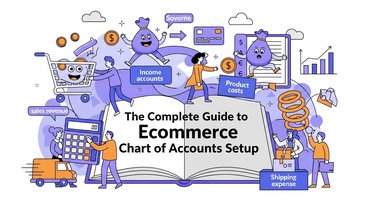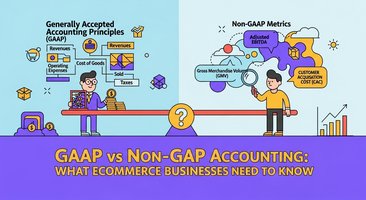Navigating ecommerce sales tax compliance has never been more complex. With over 13,000 tax jurisdictions across the United States and constantly evolving regulations, staying compliant requires more than just good intentions—it demands expertise, precision, and the right tools.Since the landmark South Dakota v. Wayfair decision in 2018, states have aggressively expanded their reach to capture revenue from online businesses. Economic nexus thresholds, marketplace facilitator laws, and digital product taxation have created a web of compliance requirements that can overwhelm even the most organized business owners.The stakes are high. Non-compliance can result in penalties, interest charges, and costly audits that can cripple your business. But with the right knowledge and systems in place, you can turn sales tax compliance from a burden into a competitive advantage.
Understanding Sales Tax Nexus in 2025
Sales tax nexus is the connection between your business and a state that creates a tax obligation. In 2025, there are two primary types of nexus that ecommerce businesses must monitor:Physical NexusPhysical nexus occurs when your business has a tangible presence in a state. This includes:
- Having employees, contractors, or representatives in the state
- Storing inventory in warehouses (including third-party fulfillment centers)
- Owning or leasing property, equipment, or office space
- Attending trade shows or conducting business meetings
- Making deliveries with company-owned vehicles
Economic NexusEconomic nexus is triggered when your sales volume or transaction count exceeds state-specific thresholds. Most states use one of these thresholds:
- $100,000 in annual sales (most common)
- $250,000 in annual sales (Alabama, Mississippi)
- $500,000 in annual sales (California, New York, Texas)
Some states also include transaction count thresholds, typically 200 transactions per year, though many are eliminating these requirements in 2025.
Key Changes in 2025 Sales Tax Landscape
Simplified Economic Nexus Rules
Alaska became the 14th state to eliminate its 200-transaction threshold, effective January 1, 2025. Utah followed suit on July 1, 2025. This trend simplifies compliance by focusing solely on revenue thresholds.
Expanded Digital Product Taxation
Louisiana implemented sales tax on Software as a Service (SaaS) starting January 1, 2025. Maryland began taxing IT services at a 3% rate on July 1, 2025. More states are expected to follow this trend throughout 2025.
Marketplace Facilitator Expansion
States continue expanding marketplace facilitator laws beyond traditional platforms. Many now require collection of additional fees like delivery charges, environmental fees, and local taxes.
Increased Audit Activity
State tax authorities have ramped up audit activities, particularly focusing on:
- Proper nexus determinations
- Accurate product taxability mapping
- Compliance with registration timelines
- Marketplace facilitator relationships
State-by-State Compliance Requirements
High-Volume StatesCalifornia
- Economic nexus: $500,000 in annual sales
- Registration required immediately upon exceeding threshold
- Monthly filing for most businesses
- Complex local tax jurisdictions require precise location-based calculations
Texas
- Economic nexus: $500,000 in annual sales
- Registration required within 30 days of exceeding threshold
- Monthly or quarterly filing depending on volume
- No state income tax but complex franchise tax rules
New York
- Economic nexus: $500,000 in sales AND 100 transactions
- Registration within 30 days, begin collecting 20 days later
- Quarterly filing for most businesses
- Complex local tax rules in New York City
Florida
- Economic nexus: $100,000 in annual sales
- Registration required immediately upon exceeding threshold
- Monthly filing for most businesses
- New permanent exemptions for disaster preparedness supplies (effective July 2025)
Medium-Volume StatesIllinois
- Economic nexus: $100,000 in sales OR 200 transactions
- Quarterly threshold monitoring required
- Monthly or quarterly filing
- Complex local tax structure with home rule municipalities
Pennsylvania
- Economic nexus: $100,000 in annual sales
- Registration by April 1 following threshold year
- Monthly or quarterly filing
- Streamlined Sales Tax Agreement participant
Ohio
- Economic nexus: $100,000 in annual sales
- Registration required upon next transaction after threshold
- Monthly filing for most businesses
- Simplified registration process for remote sellers
Specialized RequirementsColorado
- Economic nexus: $100,000 in annual sales
- 90-day grace period after exceeding threshold
- Retail delivery fee: $0.28 per qualifying delivery (effective July 2025)
- Marketplace facilitators must collect delivery fees
Minnesota
- Economic nexus: $100,000 in sales OR 200 transactions
- Retail delivery fee: $0.50 on orders over $100
- Complex local tax jurisdictions
- Quarterly filing for most businesses
Product Taxability Considerations
Understanding what products and services are taxable in each state is crucial for accurate compliance:
Generally Taxable Items
- Physical products and tangible personal property
- Digital products (varies by state)
- Software as a Service (expanding in 2025)
- Shipping charges (when not separately stated)
Common Exemptions
- Clothing (in some states with thresholds)
- Food for home consumption
- Prescription medications
- Manufacturing equipment (in most states)
- Resale items (with proper exemption certificates)
Gray Areas Requiring Attention
- Cloud-based services and data storage
- Digital downloads vs. streaming services
- Installation and professional services
- Bundled products and services
Registration and Filing Requirements
Registration Process
Most states require registration within 30-60 days of establishing nexus. Key steps include:
- Determine nexus establishment date
- Gather required business information
- Complete state-specific registration forms
- Obtain sales tax permits or licenses
- Set up filing frequency (monthly, quarterly, or annually)
Filing Deadlines
Filing deadlines vary by state but typically fall on:
- 20th of the following month (monthly filers)
- Last day of the month following quarter-end (quarterly filers)
- January 31st (annual filers - rare for businesses with significant volume)
Common Filing Mistakes
- Missing local tax jurisdictions
- Incorrect product taxability classifications
- Failing to report exempt sales properly
- Not accounting for marketplace facilitator collections
- Missing filing deadlines due to poor calendar management
Automation: The Key to Sustainable Compliance
Manual sales tax management becomes impossible as your business scales across multiple states. The complexity of tracking nexus, calculating taxes, and filing returns across thousands of jurisdictions requires sophisticated automation.
Benefits of Sales Tax Automation
Accurate Calculations
Automated systems maintain real-time tax rate databases covering all 13,000+ US tax jurisdictions. This ensures accurate calculations even for complex scenarios like:
- Mixed taxability in single orders
- Location-based tax variations
- Special district taxes and fees
- Holiday and exemption periods
Nexus Monitoring
Advanced platforms continuously monitor your sales activity across all states, automatically alerting you when you approach nexus thresholds. This proactive approach prevents compliance gaps and reduces audit risk.
Streamlined Filing
Automation platforms can prepare and file returns in all required jurisdictions, ensuring deadlines are met and reducing the administrative burden on your team.
How Klavena Transforms Ecommerce Sales Tax Compliance
Klavena's comprehensive automation platform addresses every aspect of multi-state sales tax compliance:
Intelligent Nexus Tracking
Our system continuously monitors your sales across all 50 states, automatically identifying when you establish nexus through economic or physical presence. You'll receive alerts before thresholds are reached, allowing proactive compliance planning.
Multi-Channel Integration
Whether you sell on Amazon, Shopify, eBay, Etsy, or direct-to-consumer channels, Klavena seamlessly integrates with your existing systems to capture all sales data and ensure comprehensive compliance.
Real-Time Tax Calculations
Our platform calculates sales tax in real-time for all 13,000+ US tax jurisdictions, accounting for:
- Product-specific taxability rules
- Customer location-based rates
- Special district taxes and fees
- Temporary rate changes and holidays
Automated Registration and Filing
When nexus is established, Klavena handles the entire registration process and ongoing filing requirements. Our team of experts ensures all paperwork is completed accurately and on time.
QuickBooks Integration
All sales tax data flows seamlessly into your QuickBooks system, maintaining clean financial records and simplifying year-end reporting.
Best Practices for Ecommerce Sales Tax Compliance
Implement Proactive Monitoring
Don't wait until you've clearly exceeded thresholds. Monitor your sales regularly and prepare for compliance before nexus is established.
Maintain Detailed RecordsKeep comprehensive records of:
- Sales by state and jurisdiction
- Product taxability determinations
- Exemption certificates
- Filing confirmations and payment receipts
Stay Informed About Changes
Sales tax laws change frequently. Subscribe to updates from state tax authorities and consider working with experts who monitor these changes professionally.
Plan for Audits
Maintain audit-ready documentation and consider conducting internal compliance reviews annually.
Leverage Professional Expertise
Sales tax compliance is complex enough to warrant professional assistance. Whether through software platforms like Klavena or tax professionals, ensure you have expert support.
The Cost of Non-Compliance
The financial impact of sales tax non-compliance extends far beyond the taxes owed:
Penalties and Interest
Most states impose penalties of 10-25% of unpaid taxes, plus interest that compounds monthly. For businesses with significant sales volume, these penalties can reach tens of thousands of dollars.
Audit Costs
Sales tax audits typically cost $15,000-$50,000 in professional fees, plus the internal time required to respond to auditor requests.
Business Disruption
Audits can consume weeks or months of management time, disrupting operations and strategic initiatives.Reputational RiskTax compliance issues can damage relationships with customers, suppliers, and financial partners.
Looking Ahead: 2025 and Beyond
The sales tax landscape will continue evolving in 2025:
Continued Digital Taxation Expansion
More states will implement taxes on digital services, SaaS platforms, and data collection activities.
Simplified Compliance Programs
States may introduce more streamlined programs for small businesses and specific industries.
Enhanced Enforcement
Expect increased audit activity and more sophisticated data matching between states and federal tax authorities.
Technology Integration
API-based tax solutions will become standard, with real-time compliance becoming the norm rather than the exception.
Conclusion
Ecommerce sales tax compliance in 2025 requires a strategic approach that combines legal expertise, technological sophistication, and proactive management. The complexity of multi-state compliance makes automation not just beneficial, but essential for sustainable growth.
By understanding nexus rules, staying current with regulatory changes, and implementing robust compliance systems, you can transform sales tax from a business burden into a competitive advantage. The businesses that invest in proper compliance infrastructure today will be best positioned for growth in the increasingly complex regulatory environment.
Don't let sales tax compliance hold back your growth. With the right tools and expertise, you can confidently expand into new markets while maintaining full compliance across all jurisdictions.
Whether you're just establishing nexus in your first state or managing compliance across dozens of jurisdictions, the key is having systems and support that scale with your business. Klavena's comprehensive platform provides everything you need to stay compliant, reduce risk, and focus on what matters most—growing your business.





